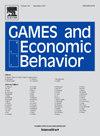Strategy-proof preference aggregation and the anonymity-neutrality tradeoff
IF 1
3区 经济学
Q3 ECONOMICS
引用次数: 0
Abstract
Consider a setting in which individual strict preferences need to be aggregated into a social strict preference relation. For two alternatives and an odd number of agents, it follows from May's Theorem that the majority aggregation rule is the only one satisfying anonymity, neutrality and strategy-proofness (SP). For more than two alternatives, anonymity and neutrality are incompatible for many problem instances and we explore this tradeoff for strategy-proof rules. The notion of SP that we employ is Kemeny-SP (K-SP), which is based on the Kemeny distance between social orderings and strengthens previously used concepts in an intuitive manner. Dropping anonymity and keeping neutrality, we identify and analyze the first known nontrivial family of K-SP rules, namely semi-dictator rules. For two agents, semi-dictator rules are characterized by strong unanimity, neutrality and K-SP. For an arbitrary number of agents, we generalize semi-dictator rules to allow for committees and show that they retain their desirable properties. Dropping neutrality and keeping anonymity, we establish possibility results for three alternatives. We provide a computer-aided solution to the existence of a strongly unanimous, anonymous and K-SP rule for two agents and four alternatives. Finally, we show that there is no K-SP and anonymous rule which always chooses one of the agents' preferences.
防策略偏好聚合和匿名中立性权衡
考虑一个需要将个人严格偏好聚合为社会严格偏好关系的设置。对于两个备选方案和奇数个agent,由May定理可知多数聚集规则是唯一满足匿名性、中立性和策略抗性的规则。对于两个以上的替代方案,匿名性和中立性在许多问题实例中是不兼容的,我们将为策略证明规则探索这种权衡。我们使用的SP概念是Kemeny-SP (K-SP),它基于社会秩序之间的Kemeny距离,并以直观的方式加强了先前使用的概念。放弃匿名性并保持中立性,我们识别并分析了已知的第一个非平凡的K-SP规则家族,即半独裁者规则。对于两个agent,半独裁者规则具有强一致性、中立性和K-SP特征。对于任意数量的代理,我们推广了半独裁者规则,以允许委员会,并表明它们保留了理想的属性。放弃中立性和保持匿名性,我们建立了三种选择的可能性结果。我们给出了两个agent和四个alternative的强一致、匿名和K-SP规则存在性的计算机辅助解。最后,我们证明了不存在K-SP和匿名规则总是选择一个代理的偏好。
本文章由计算机程序翻译,如有差异,请以英文原文为准。
求助全文
约1分钟内获得全文
求助全文
来源期刊

Games and Economic Behavior
ECONOMICS-
CiteScore
1.90
自引率
9.10%
发文量
148
期刊介绍:
Games and Economic Behavior facilitates cross-fertilization between theories and applications of game theoretic reasoning. It consistently attracts the best quality and most creative papers in interdisciplinary studies within the social, biological, and mathematical sciences. Most readers recognize it as the leading journal in game theory. Research Areas Include: • Game theory • Economics • Political science • Biology • Computer science • Mathematics • Psychology
 求助内容:
求助内容: 应助结果提醒方式:
应助结果提醒方式:


